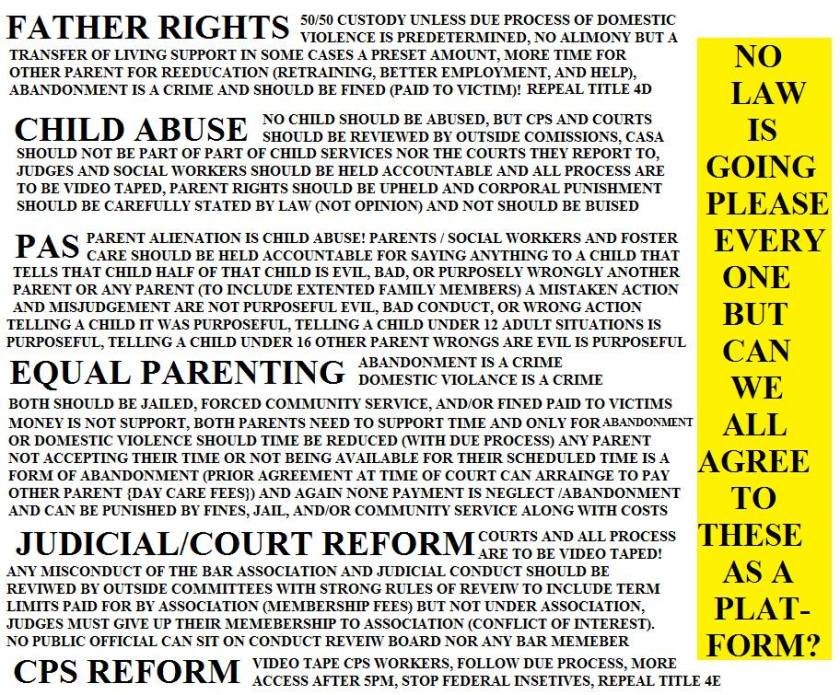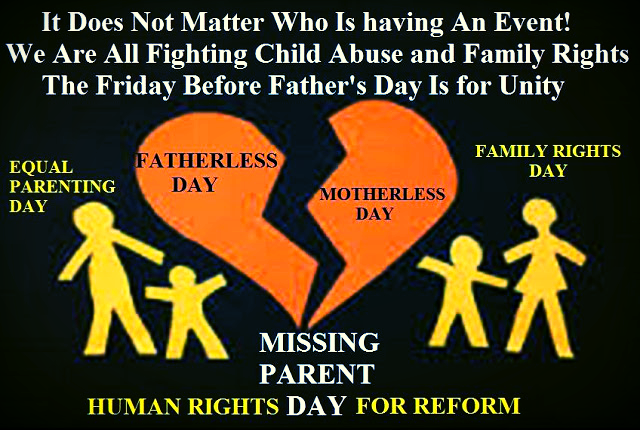Individuals with either of these syndromes may be willing and able to lie in court in a fully convincing way. Sometimes, their manipulative skills are so well developed that they are able to influence others to provide false testimony against the victimized parent.
Sometimes, their manipulative skills are so well developed that they are able to influence others to provide false testimony against the victimized parent.
They may run circles around opposing counsel. When accused of visitation interference, they often have what appear to be wonderful explanations for their behavior; some may even be accurate. For example: “I offered many times for him to see his daughter but he just doesn’t cooperate; every time he comes to pick up Billy, Billy cries and refuses to go: he never follows the schedule, your honor, no matter how hard I try. …”
What typically is left out of such testimony is the fact that the interfering parent is either lying or has manipulated the child or the situation to give a false impression that he or she is innocent of the charges.
Disparities in State Family Courts
If the interfering parent continues to violate successfully the visitation regulations, over time the victimized parent often becomes so emotionally and financially depleted that the case fades from the court’s purview. Unfortunately, outside of the courtroom, the visitation interference continues, often with increased strength.
|
|
|
|
 |
DIVORCE-RELATED, MALICIOUS PARENT SYNDROME |
|
|
|
Another syndrome — the divorce-related, malicious mother syndrome — has been identified in cases in which mothers not only try to alienate their children from their fathers, but are committed to a broadly based campaign to hurt the father directly (Turkat, 1995). The diagnostic criteria for this syndrome are listed in Figure 1. Some examples of the more extreme behavior observed in such individuals include the following: making one’s children sleep in a car to prove that their father has bankrupted them; burning down the house of the ex-husband: making false allegations of sexual abuse; manipulating other people to harass the ex-husband: spreading vicious lies about the ex-husband; trying to get the ex-husband fired from his job; and driving an automobile into the ex-husband’s living room. Women with this syndrome interfere chronically with visitation. Though they also engage in serious attempts to alienate the child from the father, they an not always successful. Thus, a full parental alienation syndrome is not required for a diagnosis of divorce-related. malicious mother syndrome. In addition. these women are skillful liars, highly manipulative, and quite adept at recruiting others to participate in the campaign against the father. As is true of parental alienation syndrome, there is an absence of necessary research on this abnormality. |

WANTED ~ Pitch us your investigations on disparities in State Courts.
Reveal from The Center for Investigative Reporting is launching a new reporting initiative to examine how the poor and minorities fare in state courts around the country.
Impressive work – uncovering system-wide disparities and issues related to court fines, bail, jury selection and sentencing – already is being done. But what problems aren’t being identified? What stories aren’t being told?
We are looking for reporting proposals that dive deeply into a region or reach broadly across the country, particularly those with potential for radio. (If you have radio skills, that’s a plus.) We plan to establish reporting partnerships in some cases, award freelance contracts in others. This initiative will continue into 2017, so ambitious ideas are welcome.
Send us a one-page pitch that also addresses these basic questions:
Will this uncover a hidden problem and/or tell our audience something new?
Who is being harmed and how?
Can you quantify the problem?
Who is responsible, and can you prove it?
If you already have begun reporting on this topic or it builds on past work, include this information as well:
Who are some primary characters for the story?
Tell us about any tape you already have gathered.
If other outlets already have covered some of your story, please include links and a brief explanation of how your story will be different.
Email your pitches to me, Amy Pyle, Managing Editor, at apyle@cironline.org, using “State Courts Pitch” in the subject line. Deadline: Dec. 10.
Do Dads REALLY Get Dissed In Divorce Court?
We hear a lot about how the courts are biased in favor of mothers when deciding child custody.
HUFFINGTONPOST.COM
 You look at the actions and you will see who is willing to sacrifice themselves and who is willing to sacrifice they’re child.
You look at the actions and you will see who is willing to sacrifice themselves and who is willing to sacrifice they’re child. STOP UNJUSTIFIED PARENT-CHILD CONTACT DENIAL
STOP UNJUSTIFIED PARENT-CHILD CONTACT DENIAL
Family Court is a crooked system and I’ve seen more then enough to know MOST parents who have custody aren’t worthy of the task. Just like many parents with visitations are disgruntled to have to “borrow” they’re own child ” in the best interest of the child”….
That does NOT make you a deadbeat-it makes you a HERO!
The BEST Parent is BOTH Parents!
Below are a few stats from a Pew Research Center analysis of the National Survey of Family Growth (NSFG) released in June of 2011.
According to the report, a married father spends on average 6.5 hours a week taking part in primary child care activities with his children. The married mother spends on average 12.9 hours. Since two-income households are now the norm, not the exception, the above information indicates that not only are mothers working, but they are also doing twice as much child care as fathers.
It only makes sense that mothers who have a closer bond due to the time spent caring for a child be the one more likely to retain primary custody after a divorce.
More startling are the stats on absent fathers, or the amount of time fathers spend with children once the divorce is final. According to the above study, when fathers and children live separately, 22 percent of fathers see their children more than once a week. Twenty-nine percent of fathers see their children one to four times a month. The most disturbing fact though is that 27 percent of fathers have no contact with their children at all.
When you take into consideration that mothers spend more time taking care of children before divorce and only 22 percent of fathers take advantage of spending what I would consider quality time with their children after the divorce, the fact that more mothers retain custody seems reasonable… doesn’t it?
NO!!!

Many men argue that family courts send the message that fathers are not essential to raising children. Not essential beyond the point of giving a percentage of their paychecks to the mother of their children anyway. They argue that the courts consider them nothing more than weekend visitors and that so few fathers take an active role in parenting after divorce due to the blatant bias they experience during the divorce process and the determination of child custody.
Some fathers, those among the 27 percent who have no contact with their children post-divorce, may even argue that gender bias during divorce litigation is the reason they no longer engage in parenting or any form of relationship with their children.
But don’t you need to take into consideration how child custody is decided in the majority of divorce cases before blaming gender bias on a father’s post-divorce status? What do the statistics say about how custody is decided during divorce and whether or not there is a true gender bias?
From Bullshit Hill. · Kenansville, FL ·






















































Reblogged this on World4Justice : NOW! Lobby Forum..
LikeLiked by 4 people
LikeLiked by 2 people